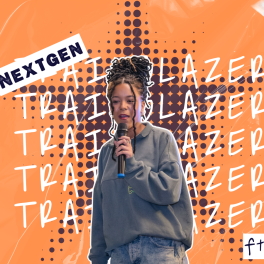
When I was 12 years old, I attended middle school in a rural part of Ohio. The middle school was public, and not affiliated with any religion.
One day, during one of my class periods, a woman from an outside organisation came in to give us a brief sex education talk.
However, the presentation was for an abstinence-only program and was full of scare tactics, falsehoods, and unhelpful attitudes towards sex. The entire program was presented with the premise that our peers were going to try to pressure us into sex and under no circumstances should we succumb to that pressure and engage in any sexual activity before marriage.
It was like the purpose of the presentation was not to teach us about safe sex, but rather provide us with numerous ways that we could say no and get out of situations that might lead to intimacy.
Sex before marriage was portrayed as scary and wrong. It was as if any suggestions of sexual behavior from our peers should be treated as an attack we needed to defend ourselves against.
There was no discussion about how to navigate a situation where you would be comfortable and interested in having an intimate relationship with anyone. There was no conversation about healthy relationships, setting/respecting boundaries, or consent. The only acknowledgment of the possibility that any of us in the room could be interested in sex before marriage was followed by all of the reasons why that was a horrible and dangerous idea.
We were lectured about the risks of unwanted pregnancies and the transmission of STDs, both of which are valid risks to engaging in sexual activity. However, instead of leading the conversation onto the importance of using condoms or other forms of birth control, we were simply told that in order to avoid the consequences of sex before marriage, we must practice abstinence.
One of the particularly harmful things I remember about the lecture was that the presenter gave the impression that if you had sex before marriage you were damaged goods and that your spouse would be disappointed with you if you did not save yourself for them. This was particularly aimed at the females in the room because we were told “your husband will be able to tell if it’s not your first time”.
Another one of her ridiculous arguments for why you shouldn’t engage in premarital sex was that if you marry someone other than the person you previously engaged in sexual activity with, you might slip up and accidentally say your previous partner’s name in bed rather than your spouse’s.
Overall, it was presented as if you were a bad person or would be seen less worthy if you were intimate with anyone before your wedding night. At the end of the presentation, we were all given a “v-card”, a pseudo credit card meant to represent our virginities. We were told that we should protect our “v-cards” at all costs.
The “v-cards” had a pledge on the back of them that we were meant to sign and date. The pledge read: “Believing that I am worth waiting for, I commit to myself, my future spouse, my future children, and those who care about me now, that, from this day forward I will abstain from all behaviors that could harm my marriage, my commitment, or myself by practicing chastity. – Abstinence Expiration Date: Wedding Day”.
It is incredibly damaging and outrageous to portray to young students that engaging in any consensual and loving sexual behavior before marriage would undoubtedly ruin their relationships with their future spouse, future children and loved ones, as their worth would be diminished. To add to the absurdity, the “v-card” doubled as a Domino’s pizza coupon.
My ridiculously bad sex education experience is unfortunately one that I believe many students in the US can relate to. With nearly 200,000 babies born to young women aged 15-19 in the US every year, it is clear that abstinence-only sex education programs are not working.
Beyond the worryingly high number of teen pregnancies in the US, I believe poor sex education programs are a large contributor to the way young females, in particular, are treated in regard to their sexual activity. In high school, it was common for girls to be looked down upon or shamed for having sex even if it was with their long-term boyfriends. It is also worrying that, for the majority of US students, the first time they go through any consent training is at the beginning of their first year of university.
Thankfully for me, I have a mom who felt comfortable enough to properly teach me about sex a few years before I was given that presentation. However, for many kids in the US, abstinence-only programs are the only sex education they receive, beyond what they hear from their friends.
It is important to include abstinence in sex education programs to promote it as an option people can practice if that is what they feel comfortable doing. However, it is crucial that more comprehensive sex education programs become the standard in US public schools to reduce the number of teen pregnancies and to promote healthy relationships. It is also important that these programs acknowledge relationships beyond heterosexual ones.
Sex education and healthy relationship programs are meant to be delivered at a time when young people are beginning to experience sexual feelings and explore their sexuality. Therefore, it is imperative to have honest, inclusive, and informative programs, not ones that are one-dimensional and based on shaming young people.
More for you
Support Young Creators Like This One!
VoiceBox is a platform built to help young creators thrive. We believe that sharing thoughtful, high-quality content deserves pay even if your audience isn’t 100,000 strong.
But here's the thing: while you enjoy free content, our young contributors from all over the world are fairly compensated for their work. To keep this up, we need your help.
Will you join our community of supporters?
Your donation, no matter the size, makes a real difference. It allows us to:
- Compensate young creators for their work
- Maintain a safe, ad-free environment
- Continue providing high-quality, free content, including research reports and insights into youth issues
- Highlight youth voices and unique perspectives from cultures around the world
Your generosity fuels our mission! By supporting VoiceBox, you are directly supporting young people and showing that you value what they have to say.





